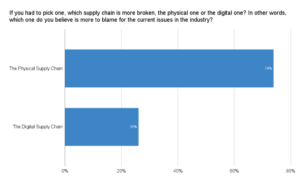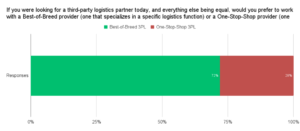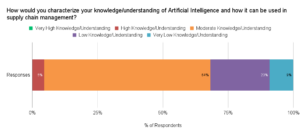
There is a butterfly in my neck.
It’s been keeping me up at night, feeding off me, and making me anxious.
It’s the beginning of a poem, or a horror story, or perhaps a romantic comedy. I don’t know where it’s going yet, what words will come next, but that’s what makes writing so interesting, so frustrating, so mysterious for me — and life too. We never really know what comes next.
And sometimes we learn, for better or worse, that life is stranger than fiction.
—
Moving on, here’s the supply chain and logistics news that caught my attention this week:
2024: It Could Be Better
We’re 1/12th of the way done with 2024. How’s the year going so far? Based on many of the headlines above, the best you can say is, “It could be better.”
“United Parcel Service plans to cut 12,000 jobs and explore strategic options for Coyote, its volatile trucking brokerage business, after the world’s largest parcel delivery company forecast full-year revenue below Wall Street’s target,” reported Lisa Baertlein and Ananta Agarwal in Reuters.
On the earnings call, UPS CEO Carol Tome said, “[The acquisition of Coyote] was a very thoughtful strategic rationale to expand the portfolio. But I don’t think we fully understood at the time just how cyclical this business is.”
(Really? UPS didn’t understand how cyclical the transportation/brokerage industry is? That’s Transportation 101 stuff, but okay.)
Paul Berger in the Wall Street Journal reported that “Logistics technology companies are cutting costs and slashing staff as a prolonged slump in freight stretches into 2024. Freight forwarder Flexport, digital broker Uber Freight, and warehousing provider Flexe are cutting workers this year following waves of layoffs in 2023 across technology-focused freight startups.”
And in Supply Chain Dive, Max Garland writes:
“In December [2023], the number of warehousing and storage employees fell to 1.85 million workers, according to preliminary data from the Bureau of Labor Statistics. That’s the lowest employment count in the sector since November of 2021. More layoffs are coming in the sector in 2024. Several retail brands, e-commerce players and third-party logistics providers have already disclosed facility closures and job cuts starting this year, impacting over 2,800 employees tied to warehouse and distribution operations.”
Meanwhile, on the global trade front, “The World Trade Organization will likely cut its estimates for goods trade growth for 2023 and 2024 due to a less buoyant global economy and the potential impact of disruptions to shipping through the Suez Canal, its chief economist said,” as reported by Philip Blenkinsop in Reuters.
While many carriers and logistics service providers are feeling pain at the moment, as well as some software startups facing pressure from investors and customers to become more financially stable (especially since the VC money well has run dry), there are some exceptions.
For example, Manhattan Associates announced this week record fourth quarter and full year results for 2023. “While appropriately cautious regarding the global economy, Manhattan enters 2024 from a position of strength, and we are optimistic about our growing market opportunity,” said Manhattan Associates president and CEO Eddie Capel.
And in December, Descartes Systems Group announced its fiscal third quarter results. Through Descartes’ nine-month period ended October 31, 2023 (9MFY24), the company reported revenues of $424.7 million, up 18% from $360.9 million in the same period the previous year. Edward J. Ryan, Descartes’ CEO, commented:
“Our network continues to grow as new customers join our community and existing customers trust us with more of their business. As a result, we delivered another strong quarter of financial results in a challenging market. We believe there’s a lot more we can do to help shippers, carriers and logistics services providers manage the complete lifecycle of shipments around the world. We have a strong financial position and the expertise to continue to invest in our business for the future.”
In general, well-managed, financially-stable software companies tend to perform well regardless of economic conditions. During “soft” times like these, the value proposition is centered on cost reduction and efficiency. During good economic times, the value proposition is focused on enabling profitable growth and scalability.
Most analysts are predicting better times ahead, especially in the second half of the year. But I’ve learned that predictions are worthless in supply chain management. As I wrote back in July 2019 in “Certainly, Maybe: Dealing With Supply Chain Uncertainty,” there’s only one thing I’m certain about: the weeks and months ahead will be filled with uncertainty. Read the post for my recommendations on how to deal with uncertainty.
And with that, have a happy weekend!
Song of the Week: “Iris” by Future Islands
[embedded content]- SEO Powered Content & PR Distribution. Get Amplified Today.
- PlatoData.Network Vertical Generative Ai. Empower Yourself. Access Here.
- PlatoAiStream. Web3 Intelligence. Knowledge Amplified. Access Here.
- PlatoESG. Carbon, CleanTech, Energy, Environment, Solar, Waste Management. Access Here.
- PlatoHealth. Biotech and Clinical Trials Intelligence. Access Here.
- Source: https://talkinglogistics.com/2024/02/02/above-the-fold-supply-chain-logistics-news-february-2-2024/
- :has
- :is
- :where
- $UP
- 000
- 1
- 10
- 12
- 13
- 2%
- 2019
- 2021
- 2023
- 2024
- 31
- 7
- 800
- 9
- a
- About
- above
- According
- acquisition
- across
- After
- ahead
- already
- Analysts
- and
- announced
- Another
- appropriately
- ARE
- around
- AS
- associates
- At
- attention
- back
- based
- BE
- become
- been
- Beginning
- believe
- below
- Berger
- BEST
- Better
- brands
- broker
- brokerage
- Bureau
- bureau of labor statistics
- business
- but
- by
- call
- CAN
- carriers
- caught
- cautious
- centered
- ceo
- certain
- chain
- challenging
- chief
- come
- Comedy
- comes
- coming
- commented
- community
- Companies
- company
- complete
- conditions
- content
- continue
- continues
- Cost
- cost reduction
- Costs
- could
- count
- Customers
- Cut
- cuts
- cutting
- Cyclical
- data
- deal
- dealing
- December
- delivered
- delivery
- digital
- disruptions
- distribution
- dive
- do
- done
- Dont
- dry
- due
- during
- e-commerce
- Earnings
- earnings call
- Economic
- Economic Conditions
- Economist
- economy
- Edward
- efficiency
- embedded
- employees
- employment
- enabling
- ended
- Enters
- especially
- estimates
- example
- existing
- Expand
- expertise
- explore
- Facility
- facing
- far
- February
- feeding
- feeling
- Fiction
- filled
- financial
- financially
- Fiscal
- focused
- following
- For
- Forecast
- Fourth
- freight
- from
- front
- frustrating
- full
- fully
- future
- General
- Global
- Global economy
- global trade
- going
- good
- goods
- Group
- Grow
- Growing
- Growth
- Half
- happy
- Have
- Headlines
- help
- horror
- How
- How To
- HTTPS
- i
- Impact
- impacting
- in
- industry
- interesting
- into
- Invest
- Investors
- IT
- ITS
- Job
- job cuts
- Jobs
- join
- journal
- jpg
- July
- just
- keeping
- Know
- labor
- largest
- layoffs
- LEARN
- learned
- less
- Life
- lifecycle
- like
- likely
- logistics
- Logistics Service Providers
- Logistics Services
- Lot
- lowest
- MAKES
- Making
- manage
- management
- many
- Market
- max
- maybe
- me
- million
- moment
- money
- months
- more
- my
- mysterious
- network
- never
- New
- news
- next
- night
- November
- number
- october
- of
- off
- Okay
- on
- ONE
- only
- Operations
- Opportunity
- Optimistic
- Options
- or
- organization
- our
- over
- Pain
- perform
- perhaps
- period
- plans
- plato
- Plato Data Intelligence
- PlatoData
- player
- players
- portfolio
- position
- Post
- potential
- predicting
- Predictions
- preliminary
- president
- pressure
- previous
- profitable
- proposition
- provider
- providers
- Quarter
- rationale
- Read
- really
- recommendations
- record
- reduction
- regarding
- Regardless
- Reported
- result
- Results
- retail
- Reuters
- revenue
- revenues
- Run
- Ryan
- Said
- same
- say
- Scalability
- Second
- sector
- service
- service providers
- Services
- several
- Shipping
- since
- slashing
- Slump
- So
- so Far
- Software
- some
- sometimes
- stable
- Staff
- Starting
- Startups
- statistics
- storage
- Story
- stranger
- Strategic
- street
- strength
- strong
- stuff
- supply
- supply chain
- supply chain management
- Systems
- Target
- Technology
- technology companies
- tend
- than
- that
- The
- The Future
- The Wall Street Journal
- the world
- their
- There.
- These
- thing
- think
- Third
- third-party
- this
- this week
- this year
- Through
- Tied
- time
- times
- to
- too
- trade
- transportation
- Trucking
- Trust
- Uber
- Uncertainty
- understand
- understood
- UPS
- us
- value
- value proposition
- VC
- very
- Video
- volatile
- Wall
- Wall Street
- Wall Street Journal
- Warehouse
- Warehousing
- was
- waves
- Way..
- we
- week
- Weeks
- WELL
- What
- will
- with
- words
- workers
- world
- world’s
- worse
- writing
- wrote
- year
- yet
- you
- youtube
- zephyrnet












